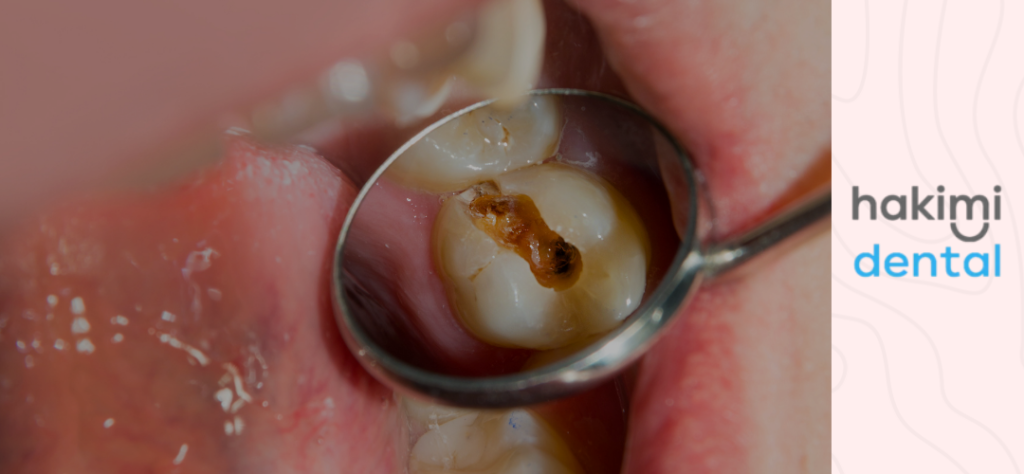Tooth decay, or dental caries, is one of the most common dental problems affecting both children and adults. But despite how widespread it is, many people don’t fully understand what causes it, how it progresses, or how to stop it before it becomes serious. In this article, we’ll cover everything you need to know about caries – including signs to look out for, treatment options, and what to do if you suspect you have caries in a wisdom tooth or caries on front teeth.
Whether you’re concerned about dental caries between teeth or want to understand how to prevent future issues, this guide will help.

What are dental caries?
Dental caries, also known as tooth decay, are permanently damaged areas on the surface of your teeth that develop into tiny holes or cavities. These are caused by a combination of factors, most notably bacteria in your mouth feeding on sugars and producing acids that wear down your enamel.
Over time, if not treated, caries can progress through the tooth and reach deeper layers, potentially leading to infection or even tooth loss.
To learn more about the biology behind tooth decay, visit the NHS page on tooth decay or Wikipedia’s overview.
What are the stages of caries?
Understanding caries stages is essential for early detection and treatment:
- Initial demineralisation – White spots appear as acids start breaking down enamel.
- Enamel decay – The enamel surface begins to break down, forming small holes.
- Dentin decay – The decay reaches the dentin layer, causing sensitivity.
- Pulp damage – Bacteria reach the pulp, leading to pain and potential infection.
- Abscess formation – A pocket of pus can form, causing severe discomfort and requiring urgent care.
If you are at the pulp damage or abscess stage, emergency treatment at Hakimi Dental Clinic may be necessary.
Common signs of caries on different teeth
- Caries on front teeth: Often easier to spot, may cause visible discolouration or chips.
- Dental caries between teeth: Harder to detect without x-rays; can cause gum inflammation or pain while flossing.
- Caries in wisdom tooth: Typically occur due to poor access for cleaning; can lead to serious infections if untreated.
Early intervention makes all the difference. That’s why regular check-ups with a dental hygienist in Oldbury can help spot these issues before they become problematic.
How to stop dental caries from progressing
Preventing and stopping caries involves a mix of daily habits and professional care. Here’s how you can do it:
- Brush twice daily with fluoride toothpaste.
- Use interdental brushes or floss to remove plaque between teeth.
- Reduce sugar intake to minimise bacterial acid production.
- Visit your dentist regularly for check-ups and cleans.
- Use fluoride treatments or sealants if you’re at high risk.
For advanced cases, fillings may be needed. Learn more about dental fillings in Oldbury and how they can protect your teeth.
More detailed prevention advice is available through NIDCR.
Why early treatment is so important
If you leave caries untreated, it will only get worse. Decay never heals on its own. Timely treatment can prevent the need for root canals or extractions and protect the structure of your natural teeth.
At Hakimi Dental Clinic, we use digital x-rays and thorough diagnostics to detect even the smallest signs of decay. Our goal is to treat the problem as early as possible, ensuring less discomfort and lower cost for you.
Book your appointment at Hakimi Dental Clinic
If you’re experiencing symptoms or just want to ensure your teeth are healthy, don’t wait. Book a visit to Hakimi Dental Clinic in Oldbury today. Whether it’s for prevention, diagnosis, or treatment, our team is here to help you protect your smile for the long term.
FAQs - dental caries
You might notice sensitivity to sweet foods, hot or cold drinks, or visible holes or dark spots on your teeth. Regular check-ups can catch decay you can’t see.
In the earliest stage (demineralisation), caries can sometimes be reversed with fluoride and good hygiene. Once a cavity has formed, a filling is usually required.
Book an appointment with your dentist as soon as possible. Wisdom teeth are prone to decay due to limited cleaning access.
Good oral hygiene, a low-sugar diet, and fluoride use are your best natural defences. Once decay is advanced, professional treatment is necessary.
Yes, they can affect your appearance and lead to structural damage if untreated. They’re also easier to spot, so you should act quickly.
